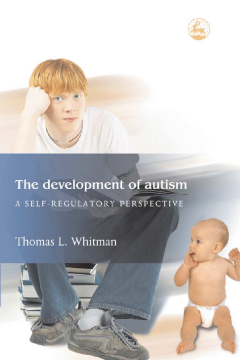
Additional Information
Book Details
Abstract
Tom Whitman proposes a new developmental theory of autism that focuses on the diversity of characteristics associated with this disorder, and how these develop over time. This theory is reconciled and integrated with contemporary theories of autism, including the social, cognitive, linguistic, sensorimotor and biological perspectives. The broader societal context in which autism emerges is also explored along with its impact on the family. Whitman draws from extensive clinical experience to examine common education and biomedical interventions and presents recommendations both for practical approaches to the everyday challenges of autism, and for future research. This comprehensive book is essential reading for parents, students, therapists, researchers and policymakers eager to improve or update their understanding of autism.
Professor Whitman, a professor of psychology at an American university, presents a systematic, up to date, overview of current knowledge about autism. I found the writing easy to read, helped by a clear layout and regular subheadings to subdivide the text. I found the book stimulating and educational and I think the combination of well-referenced recent research and an accessible format makes this an excellent place to start for the interested, educated, lay reader, and provides a useful refresher for mental health workers.
European Child & Adolescent Psychiatry
Thomas L. Whitman is a Professor of Psychology at The University of Notre Dame, USA and Co-director of the Graduate Research Training Program in Mental Retardation. He is the author of over 90 empirical articles, chapters and books. His research and teaching has focused on children at risk for developmental problems, with a special interest in studying children who demonstrate significant resiliency in the face of risk.
His most recent books include Interwoven lives: Adolescent mothers and their children (2001) and Lifespan perspectives on health and illness (1999). For the past 10 years he has worked with families, helping them establish educational programs for children with autism spectrum disorders.
Whitman's text is perhaps the first comprehensive book aimed partly at social policymakers as members of the interdisciplinary team... the book is easy to read yet respectful; it does not speak over the layperson, nor does it talk down to him or her. The organization of the chapters serves well for an easy read or a quick reference. The recommendations are feasible and strategic. Furthermore, Whitman does not recommend specific interventions because he has established already that individuals need individual assessment and treatment. As a researcher on ASD, an educator, an aunt of five persons, and a music therapist who depends on policymakers to mandate suitable guidelines based on theory, science, and practical findings in order to fund research, provide for children in need, and support promising interventions, I highly recommend this book to all of the intended audiences.
Focus on Autism and Other Developmental Disabilities
Table of Contents
| Section Title | Page | Action | Price |
|---|---|---|---|
| Preface 11 | |||
| Notes on the Materials 15 | |||
| Chapter 1 | |||
| NGOs—WHAT ARE THEY AND WHY DO PEOPLE GET SO | |||
| EXCITED ABOUT THEM 17 | |||
| Chapter 2 | |||
| THE CONFUSING SITUATION OF NGOs, THE GOVERNMENT | |||
| AND THE PRESS IN BANGLADESH—JULY-AUG '92 25 | |||
| Chapter 3 | |||
| THE PRINCE, THE MERCHANT, AND THE CITIZEN—LONG | |||
| LIVE THE CITIZENS ASSOCIATIONS! 31 | |||
| Chapter 4 | |||
| CIVIL SOCIETY: THE NON-PROFIT PRIVATE SECTOR 37 | |||
| Chapter 5 | |||
| NGOs ARE ONLY ONE PART OF THE THIRD SECTOR IN | |||
| THE SOUTH—AN ANALYSIS FROM BANGLADESH 51 | |||
| Chapter 6 | |||
| THE GREAT VALUE OF NON-GOVERNMENT | |||
| ORGANIZATIONS IN BANGLADESH: AN | |||
| INTRODUCTION FOR PARLIAMENTARIANS 69 | |||
| Chapter 7 | |||
| INTRODUCTION TO THE THIRD SECTOR OF | |||
| SOCIETY—THE VOLUNTARY SECTOR 77 | |||
| 8 Supporting Citizens' Initiatives | |||
| Chapter 8 | |||
| SUPPORTING THE SUSTAINABILITY OF THE NGO | |||
| SECTOR—NOT JUST MORE FUNDS FOR NGOs 105 | |||
| Chapter 9 | |||
| OPTIONS FOR SUSTAINABILITY 111 | |||
| Chapter 10 | |||
| ALTERNATIVES TO DONOR FUNDS FOR SOUTH ASIAN | |||
| NGOs—WHAT DO WE KNOW AND WHAT DO WE NEED | |||
| TO KNOW? 125 | |||
| Chapter 11 | |||
| BACKGROUND ON THE PROPOSED NGO BILL 1993 143 | |||
| Chapter 12 | |||
| NGOs, POLITICAL PARTIES AND GOVERNMENT—THE | |||
| ELECTION OF 1991 AND ITS AFTERMATH 149 | |||
| Chapter 13 | |||
| NGOs AND POLITICAL PARTIES—THE CASE OF | |||
| KHET MAJUR SAMITY 159 | |||
| Chapter 14 | |||
| PERSPECTIVES ON THE ENABLING ENVIRONMENT IN | |||
| BANGLADESH—OPPORTUNITIES AND CHALLENGES FOR | |||
| NGOs AND PEOPLES ORGANIZATIONS 169 | |||
| Chapter 15 | |||
| BUILDING THE SECTOR—HOW PRIP HELPS TO BUILD THE | |||
| NGO CAPACITY IN BANGLADESH 183 | |||
| Chapter 16 | |||
| OVERVIEW OF POVERTY ALLEVIATION AND PVDOs' | |||
| ROLE IN BANGLADESH 199 | |||
| Index 233 |
